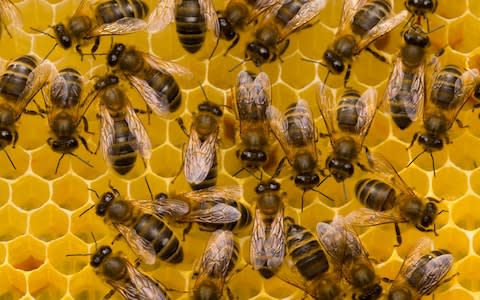Glyphosate weed killers could be harming bees, warn scientists
Bees could be dying as a result of exposure some of Britain’s most popular weed killers, new research suggests.
Scientists in the US found evidence that glyphosate , the active ingredient in Roundup and many other brands, may be contributing to the decline of honey bees.
Glyphosate herbicides are the most widely used herbicide in UK agriculture with 5.4 million acres of farmland across Britain treated with the chemical annually.
The study, by the University of Texas, showed worker bees exposed to the glyphosate lose beneficial gut bacteria, which is likely to leave them vulnerable to infections.
Lead researcher Erick Motta, from the University of Texas, US, said: "We need better guidelines for glyphosate use, especially regarding bee exposure, because right now the guidelines assume bees are not harmed by the herbicide. Our study shows that's not true."
In a test case in the US last month a jury found that Roundup would have contributed to Dewayne Johnson’s cancer and makers Monsanto were ordered to pay £226 million in damages.
The company has vowed to appeal and maintains that its glyphosate products are safe, as do the other manufacturers of the chemical.
In the new study scientists exposed honey bees to glyphosate at levels known to occur in crop fields, gardens and road sides.

After three days, the exposed bees were found to have significantly reduced levels of healthy gut bacteria compared to non-exposed insects.
The most affected benign bug, Snodgrassella alvi, is critical to bee well-being, helping the insects process food and keep out dangerous infectious agents.
Bees with impaired gut "microbiomes" - microbe populations - were also far more likely to die when later exposed to a harmful invasive bacterium. Nine out 10 bees died compared to five out of 10 of the insects who were not exposed to glyphosate .
Professor Nancy Moran, also from the University of Texas, who co-led the research, said: "Studies in humans, bees and other animals have shown that the gut microbiome is a stable community that resists infection by opportunistic invaders.
“So if you disrupt the normal, stable community, you are more susceptible to this invasion of pathogens."
The scientists, urged farmers and homeowners to avoid spraying glyphosate herbicides on flowering plants likely to attract bees.
British expert Professor Dave Goulson, from the University of Sussex, said: "Those of us that study bees have long ago come to the conclusion that colony health is adversely affected by a number of interacting stressors, including exposure to cocktails of insecticides and fungicides, impacts of pathogens, and effects of poor nutrition.
"It now seems that we have to add glyphosate to the list of problems that they face. This study is also further evidence that the landscape-scale application of large quantities of pesticides has negative consequences that are often hard to predict."
The research was published in the journal Proceedings of the National Academy of Sciences.

 Yahoo News
Yahoo News 